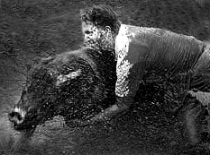Never Wrestle with Pigs
05/22/2013 Leave a comment
 George Bernard Shaw once said,
George Bernard Shaw once said,
Never wrestle with pigs. You both get dirty and the pig likes it.
Unfortunately as humans we are quick to point fingers, are quick to judge, and quick to blame. Add the instant actions of social media and this can at times spell misfortune. Before the world of Facebook, Twitter and blogs, if someone was quick to find flaws, they would simply share it with the friends around them. Now with a simple tweet, people can now quickly spread their thoughts and opinions across the world.
- Sometimes it sparks creativity
- Sometimes it cuts to close to the bone
- Sometimes it can come across just wrong.
On a national level there has been so much bad news within the past few weeks. From Boston to Oklahoma, tragedy has affected so many people. As a nation, we pause, pray and quickly find ways we can help. But, as a nation, we are too quickly to point fingers, are quick to judge and quick to blame.
I’m not throwing stones, if so I would be hypocritical. At times, I have been quick to judge based on my own prejudice. Add to that my bad case of a short attention span, and..well let’s just say I can’t count the times I have put my foot in my mouth.
Rather I would like to make a request: Stop.
- The next time you read a tweet that irritates you; switch off twitter instead of blasting back a scathing reply. Stop and think about it.
- The next time you see a Facebook update that rubs you the wrong way; log off Facebook instead of un-friending someone. Stop and think about it.
Basically stop, take a deep breath and think about what you are going to say. As much as someone has the ability to write anything online, you have the ability to turn away and not participate. Of course there are exceptions, but is a comment from one person about an event really shaking your life and foundation so much that you MUST say something about it? Will what you say to that person change their perspective or just add fuel to the fire?
After all, we’re all human. We all have opinions and we all make mistakes.



